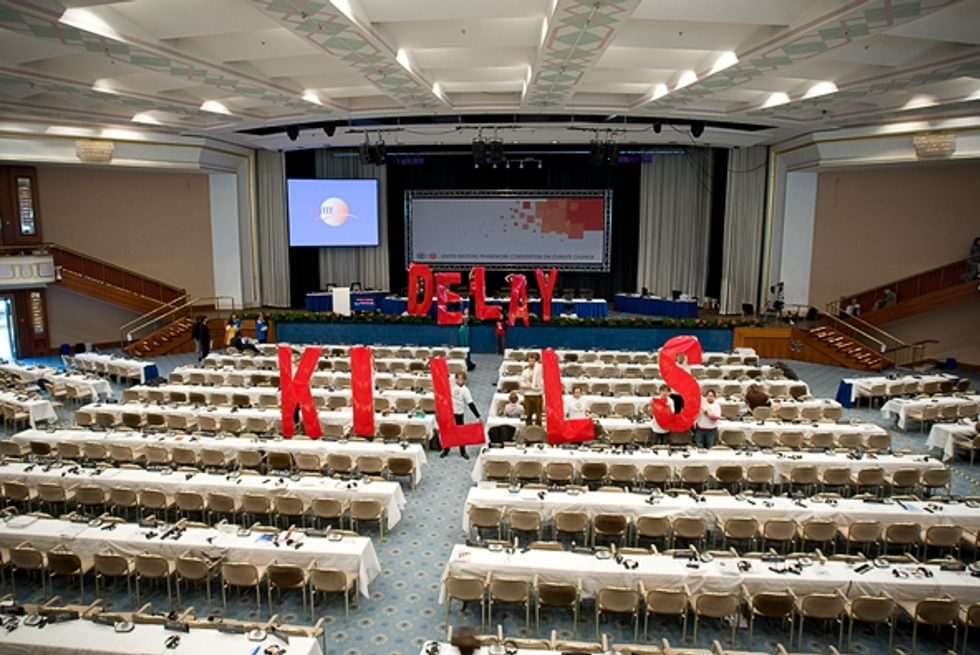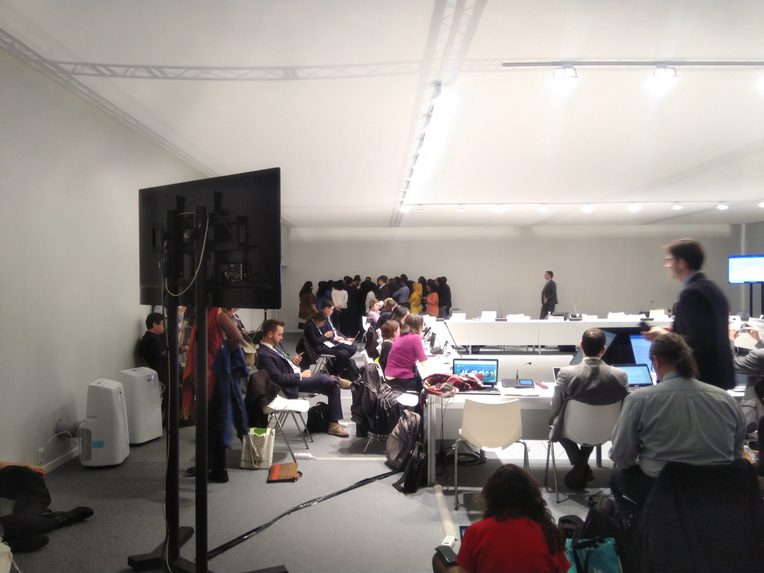The Felt Irony of Negotiation Support
From the Series: Negotiating the Crisis: Critical Perspectives on Climate Governance
From the Series: Negotiating the Crisis: Critical Perspectives on Climate Governance

Rose (a UN officer): Rushing into the temporary UN COP offices in Madrid. “Turkey is demanding a pencil. Does anyone have a pencil for me?”
Mika (another UN officer): Hands her a pencil with a big smile and sarcastic words. “Save the world with it!”.
Rose smirks and is out again.

The UN Climate Change Secretariat staff are intimately tied to an international political process through their duty to convene the United Nations Framework Convention on Climate Change (UNFCCC)’s Conference of the Parties (COP). They move to Bonn, Germany, build a life there, have children there, send them to international schools, and create a community. This all for a UN job, tied to an aspiration to tackle an existential threat facing humanity. Supporting the global community “to protect the climate system” (UNFCCC, art. 3.1), yet without having political authority to wield themselves, these international civil servants witness mainly the "boring" techno-political intricacies—but also from time to time behind-the-scenes political drama—within a vast process built through the accretion of decisions since 1992. A core part of their duties is referred to as “negotiation support” and is infrastructural in the sense that it enables politics but does not carry them out.
During the COP meetings, a large part of the staff goes on a mission of sorts, as they travel to a foreign city and set up a remote office in the conference venue. Psychologically, queuing in the diplomat line at border control with a blue UN pass creates a sense of self-importance, however meaningful individual staff genuinely feel about their work. For the 2-3 weeks of work, they will typically only have one day off.
However, staff members tell me how their explanations about their work do not meet the excitement of their questioning friends and family, in that they have to explain how they don’t really do anything—or at least none of the things people seem to expect of UN staff working on climate negotiations. Along these same lines, I have heard staff state the importance to “fight the feeling that we [the staff] are at the center of the process.”
There is this ambiguous irony to the staff’s work which stems from their positioning in close proximity to political decision-making on a high-profile and pressing issue. They may influence the political process in all kinds of informal ways, but they do not have the actual power to make formal political decisions. One can feel this irony (cf. Fernandez and Huber 2001). It shines through sarcastic jokes, as seen in the opening vignette, but it is never as tangible as when negotiations fail. That is when delegates either do not manage to conclude their deliberations with anything more than a text promising to keep trying next time, or open-ended conclusions or decisions that do not qualify as “meaningful” in the Secretariat staff vernacular. Failure, then, is also measured against a “best-case scenario” that each UN team dutifully maps out in their strategic internal briefing documents which are supposed to help the senior management take stock of progress for each item negotiated in myriad different parallel negotiation meetings from day to day through the two weeks.
At COP 25 in Madrid, a Secretariat officer learned that a contested part of the headline decision 1/CP.25 had been resolved in a backroom deal between two big state actors, and knowing that many other negotiations were failing, such as those on market mechanisms, the officer added laughingly: “so the other items, are we going to have conclusions there too because the Europeans are throwing money at things?” Preparing for years to support the brokering of certain international decisions, it may feel excruciatingly ironic when problems are suddenly resolved through bilateral agreements behind closed doors that may concern trade-offs not even related to climate politics.

When negotiations fail, it is useful for the staff to remind themselves that they only play one part in a long and complicated play that is largely improvised. However, when negotiations are successful, the staff seems to allow themselves to celebrate their support as part of the success, turning a blind eye to the possibility that someone could simply be “throwing money” behind the scenes. Yet, what feels like success to a certain Secretariat staff member and the respective delegates they support, is often ironically not seen as a success in the wider COP audience.
A complex international political process where delegates negotiate dozens of highly technical decisions in two weeks’ time has to be simplified in the media. COP 25 in Madrid was largely deemed as a failure across the media because parties did not conclude the remaining agenda items regarding the operationalization of the Paris Agreement. In the media, this is mixed with the plethora of voices—the UN Secretary-General being one—criticizing the general lack of climate ambition from the countries of the world. Whether one believes COP 25 was, in general, a failure or not, it is an objective fact that some negotiations concluded successfully while others did not conclude—or not in a “meaningful” way. This means that some staff members supported negotiations that went well, amidst a mega-event that was deemed a failure, introducing another layer of irony for those particular staffers.
I remember sitting with a group of Secretariat staff in the last plenary meeting in Madrid. In this setting, the staff often claps along with the room of delegates when decisions are gaveled, a rare moment of subjective expression by these impartially performing civil servants to the globe. A colleague allowed himself extra-strong applause when the gavel formalized the decision that he supported negotiations for. His jubilant applause, nothing more than a bit more enthusiastic than his previous ones, was also noticed by staff around me, some who seemed to find it verging on being inappropriate, both because of his connection to that particular decision, but also because overall there was the feeling of failure, a sense of sorrow, in the air. I think nobody was judging very harshly though, for at that point many of us had not slept more than a few hours over the last few days.
The deeper irony (verging on cosmic if taking the existentialism of the issue into account): How can anything feel like success while the international response to climate change is still not adequate and emissions are rising? The cynicism of such a question is the irony that the UN Climate Change Secretariat staff needs to labor through and shrug off if they are to do their job, which, however uncertain its political agency is, may count as something.

Fernandez, James W., and Mary Taylor Huber. 2001. “Introduction” in Irony in Action: Anthropology, Practice, and the Moral Imagination. Chicago: University of Chicago Press.